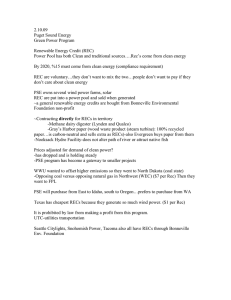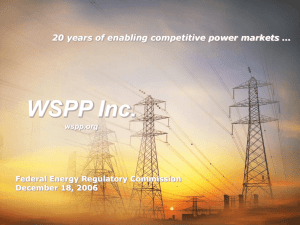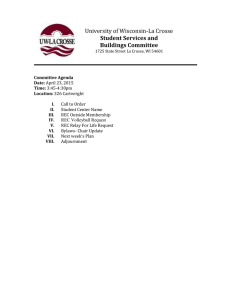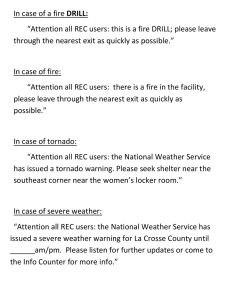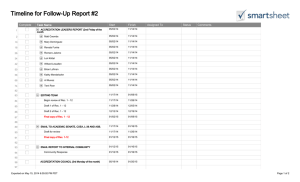Notational Order
advertisement
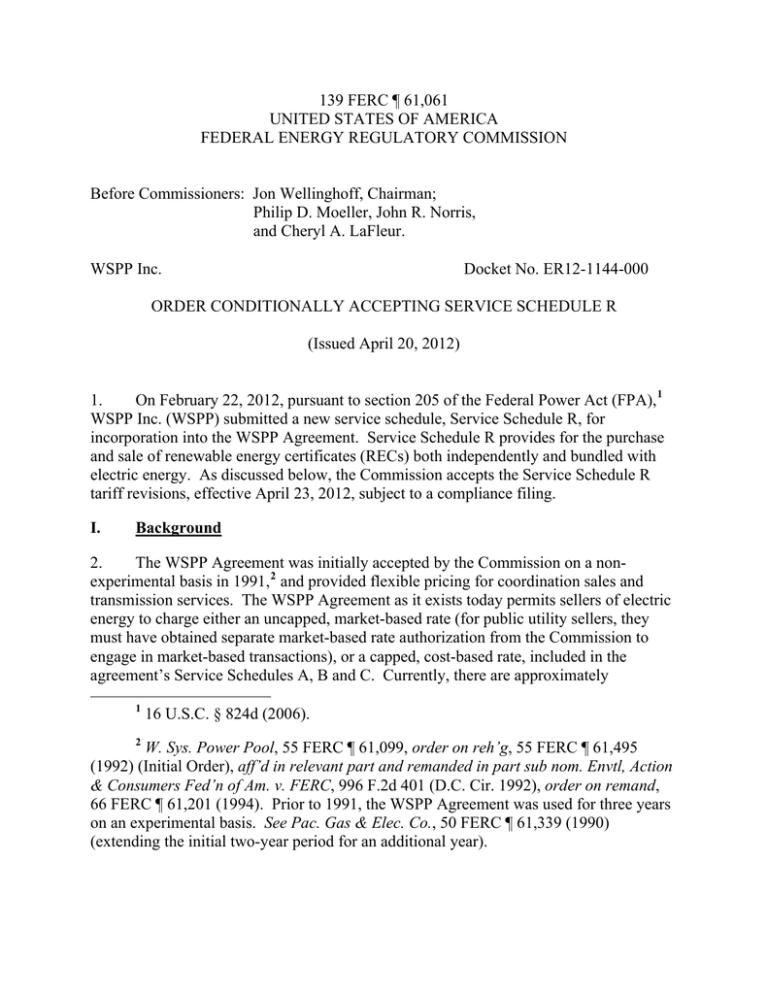
139 FERC ¶ 61,061 UNITED STATES OF AMERICA FEDERAL ENERGY REGULATORY COMMISSION Before Commissioners: Jon Wellinghoff, Chairman; Philip D. Moeller, John R. Norris, and Cheryl A. LaFleur. WSPP Inc. Docket No. ER12-1144-000 ORDER CONDITIONALLY ACCEPTING SERVICE SCHEDULE R (Issued April 20, 2012) 1. On February 22, 2012, pursuant to section 205 of the Federal Power Act (FPA), 1 WSPP Inc. (WSPP) submitted a new service schedule, Service Schedule R, for incorporation into the WSPP Agreement. Service Schedule R provides for the purchase and sale of renewable energy certificates (RECs) both independently and bundled with electric energy. As discussed below, the Commission accepts the Service Schedule R tariff revisions, effective April 23, 2012, subject to a compliance filing. I. Background 2. The WSPP Agreement was initially accepted by the Commission on a nonexperimental basis in 1991, 2 and provided flexible pricing for coordination sales and transmission services. The WSPP Agreement as it exists today permits sellers of electric energy to charge either an uncapped, market-based rate (for public utility sellers, they must have obtained separate market-based rate authorization from the Commission to engage in market-based transactions), or a capped, cost-based rate, included in the agreement’s Service Schedules A, B and C. Currently, there are approximately 1 2 16 U.S.C. § 824d (2006). W. Sys. Power Pool, 55 FERC ¶ 61,099, order on reh’g, 55 FERC ¶ 61,495 (1992) (Initial Order), aff’d in relevant part and remanded in part sub nom. Envtl, Action & Consumers Fed’n of Am. v. FERC, 996 F.2d 401 (D.C. Cir. 1992), order on remand, 66 FERC ¶ 61,201 (1994). Prior to 1991, the WSPP Agreement was used for three years on an experimental basis. See Pac. Gas & Elec. Co., 50 FERC ¶ 61,339 (1990) (extending the initial two-year period for an additional year). Docket No. ER12-1144-000 -2- 300 parties to the WSPP Agreement located throughout the United States and Canada, including private, public and governmental entities, financial institutions and aggregators, as well as wholesale and retail customers. 3 3. The WSPP Agreement includes Commission-approved service schedules: economy energy service (Service Schedule A), unit commitment service (Service Schedule B), sale or exchange of firm energy or capacity (Service Schedule C), and seller-specific, cost-based rate schedules (Schedule Q). Description of Filing 4. On February 22, 2012, WSPP filed proposed Service Schedule R for incorporation into the WSPP Agreement and related conforming changes to the main body of the WSPP Agreement. WSPP requests an effective date of April 22, 2012 for Service Schedule R. 5. Under WSPP’s proposed Service Schedule R, WSPP members would be permitted to sell and acquire three basic REC products, varying in firmness. 4 Each type of REC product may be transferred independently or bundled with energy. Consequently, WSPP proposes three REC products that may be transferred without the associated energy: (i) Firm REC; (ii) Resource Contingent REC; and (iii) Facility As-Run REC (collectively, unbundled RECs or unbundled REC transactions). WSPP also proposes three bundled REC products: (i) Firm Bundled REC; (ii) Resource Contingent Bundled REC; and (iii) Facility As-Run Bundled REC (collectively, bundled RECs or bundled REC transactions). For both unbundled and bundled REC products, a Firm REC product requires a seller to deliver, unless there was an uncontrollable force; a Resource Contingent REC product requires a seller to deliver unless there was an uncontrollable force or the renewable energy facility was not online to produce energy due to a forced outage, scheduled maintenance, or a fuel impediment; and a Facility As-Run REC product requires the seller to deliver unless the designated renewable energy facility is not online to produce energy. 5 3 WSPP Inc., 134 FERC ¶ 61,169, at P 2 (2011). 4 WSPP February 22, 2012 Filing at 3-4 (WSPP Filing) (stating that its proposed levels of firmness—Firm; Resource Contingent; and Facility As-Run—generally correspond with the firmness levels embodied in WSPP Service Schedules C, B and A respectively). 5 WSPP Filing at 4-7. Docket No. ER12-1144-000 -3- 6. Pursuant to WSPP’s proposed Service Schedule R, the rate caps identified in Service Schedules A, B, and C would apply to bundled REC transactions. The existing WSPP Agreement provides that such rate caps in Service Schedules A, B, and C do not apply when the seller “has been authorized to sell power like that provided under [the agreement] at market-based rates,” or if the seller is not a FERC-regulated public utility. 6 Also, as stated in the existing WSPP Agreement, the rate caps are subject to the submission of cost justification by the applicable seller to the Commission, and acceptance by the Commission of the cost justification. 7 Further, the existing WSPP Agreement states that the rate caps are inapplicable in the event that the seller has filed with the Commission, and the Commission has accepted, a rate schedule applicable solely to the seller and incorporated into the WSPP Agreement at Schedule Q. 8 7. In the case of bundled REC transactions, WSPP proposes that parties under the WSPP Agreement could elect to either allocate the contract price between the RECs and the energy components of a bundled REC transaction or elect to use a single, unallocated price between the RECs and energy. According to WSPP, if the parties to a bundled REC transaction elect to allocate the price, then the relevant rate cap identified in Service Schedules A, B, and C would apply solely to the price of the energy component. If, however, the parties do not allocate the price between the REC and energy components, WSPP states that those rate caps, without modification, would apply to the unallocated price as though it were a price solely for electric energy. 9 8. WSPP asserts that the terms and conditions of Service Schedule R are just and reasonable. 10 Specifically, WSPP states that the proposed tariff provisions are “expected to foster efficiency, promote liquidity, and aid in the development and liquidity of competitive markets for the purchase and sale of RECs.” 11 Further, WSPP contends that Service Schedule R would establish standard terms governing a variety of transactions while allowing parties to include transaction-specific terms. 6 WSPP Agreement at A-3.6, B-3.5, C-3.5. 7 WSPP Agreement sections A-3.7, B-3.6 and C-3.6; see also W. Sys. Power Pool, 122 FERC ¶ 61,139 (2008). 8 Id. 9 WSPP Filing at 4-7. 10 Id. at 11. 11 Id. Docket No. ER12-1144-000 -4- 9. WSPP requests that the Commission confirm that unbundled REC transactions are not subject to the Commission’s jurisdiction because such transactions do not include the sale or purchase of electric energy for resale. As such, WSPP argues that unbundled REC transactions “do not affect or relate to rates and charges for transmission or sale of energy.” 12 Moreover, WSPP contends that the Commission’s reasoning in other matters supports the conclusion that unbundled REC transactions are not subject to the Commission’s jurisdiction. 13 For instance, WSPP states that the Commission has previously found that qualifying facilities can contract for the purchase or sale of RECs separately from power sales under the Public Utility Regulatory Policies Act of 1978. 14 WSPP also asserts that the Commission has held that the sale of RECs by an exempt wholesale generator in the normal course of its business is “an activity incidental to its business of owning and operating the eligible facility and selling electricity at wholesale.” 15 Finally, WSPP argues that unbundled REC transactions are distinct and independent of wholesale sales of electricity and analogous to emission allowances, the sale of which the Commission has found are not subject to FPA section 205 review. 16 II. Notice of Filings and Responsive Pleadings 10. Notice of WSPP’s Filing was published in the Federal Register, 77 Fed. Reg. 12,826 (2012), with interventions and protests due on or before March 14, 2012. The California Department of Water Resources State Water Project and the City of Santa Clara, California, the City of Redding, California and the M-S-R Public Power Agency filed timely motions to intervene. The North Carolina Utilities Commission (North Carolina Commission) filed a notice of intervention and comments. 11. The North Carolina Commission states that it supports WSPP’s request that the Commission confirm its lack of jurisdiction over REC transactions. The North Carolina 12 Id. at 12 (citing section 205 of the FPA). 13 Id. at 12-13 (citing Smoky Hills Wind Power Project II, LLC, 125 FERC ¶ 62,286 (2008) (delegated letter order); Am. Ref-Fuel Co., 105 FERC ¶ 61,004, at P 23 (2003); Madison Windpower, LLC, 93 FERC ¶ 61,270 (2000); Edison Elec. Inst., 69 FERC ¶ 61,344 (1994)). 14 Id. at 12 (citing Am. Ref-Fuel Co., 105 FERC ¶ 61,004 at P 23). 15 Id. (quoting Madison Windpower, LLC, 93 FERC ¶ 61,270 at 61,871). 16 Id. at 13 (quoting Edison Elec. Inst., 69 FERC ¶ 61,344). Docket No. ER12-1144-000 -5- Commission adds that the Commission’s jurisdiction does not extend to either bundled or unbundled REC transactions. III. Discussion A. Procedural Matters 12. Pursuant to Rule 214 of the Commission’s Rules of Practice and Procedure, 18 C.F.R. § 385.214 (2011), the notice of intervention and timely, unopposed motions to intervene serve to make the entities that filed them parties to this proceeding. B. Substantive Matters 13. The Commission accepts the proposal to incorporate the proposed Service Schedule R into the WSPP Agreement, subject to a compliance filing, effective April 23, 2012. 17 We note that WSPP’s proposed Service Schedule R has received broad support. The WSPP Operating Committee voted in favor of adding Service Schedule R to the WSPP Agreement, which requires agreement among 90 percent of the voting members. 18 14. The Commission supports the WSPP’s efforts to facilitate the purchase and sale of RECs among WSPP members and finds the proposed Service Schedule R is consistent with the original objective of the WSPP Agreement “to capture economic benefits which were not already covered under existing agreements.” 19 By incorporating a service schedule through which RECs can be transferred, the WSPP Agreement can be used to 17 The 60-day notice period required by section 205(c) of the FPA and section 35.3 of the Commission’s regulations, 18 C.F.R. § 35.3 (2011), starts to run on the first day after the date of filing. Thus, absent a request for waiver of the Commission’s notice requirements, the earliest date a filing may become effective is the day after the 60-day notice period has expired. Thus, for WSPP’s Filing, which was filed on February 22, 2012, the 60th day of the notice period is April 22, 2012, and the earliest permissible effective date, without suspension, is April 23, 2012, rather than April 22, 2012, as proposed by WSPP. See Utah Power & Light Co., 30 FERC ¶ 61,015, at 61,024 n.9 (1985). 18 19 See WSPP Filing at 2. W. Sys. Power Pool, 55 FERC ¶ 61,099 at 61,314, order on reh’g 55 FERC ¶ 61,495 (1992). Docket No. ER12-1144-000 -6- increase efficiency and liquidity in RECs sales, which should benefit market participants. 20 15. In a bundled REC transaction, when the contract price is allocated separately between energy and RECs, WSPP proposes that the rate caps included in the existing WSPP Agreement apply to the price of the energy component. When the contract price is not separately allocated between RECs and energy, WSPP proposes that the rate caps would apply to the single contract price. WSPP adds that if the application of the rate cap to the single contract price is insufficient to cover the costs for the transaction, then the member can propose a new price cap for inclusion in the filed Schedule Q.21 The Commission finds this method of addressing the rate cap to be just and reasonable because when the contract price is separately allocated between energy and RECs the cap will apply to the energy rate consistent with the original application of the rate cap. Also, if the parties to a bundled REC transaction do not separately allocate the price between energy and RECs, the cap applies to the single price, and parties can file with the Commission to revise their rate cap. Thus, WSPP members have the opportunity to attempt to adjust their rate cap if necessary. 16. Nevertheless, the provision included in proposed sections R-2.3.2., 2.3.4(b), 2.3.6(b) of the WSPP Agreement to apply the rate cap to bundled REC transactions is unclear. The proposed provision states, “If the Contract Price is allocated between the REC and the Energy, the hourly rate caps identified in Section [C-3.6, B-3.6, A-3.7] shall apply to the Contract Price for the Energy.” As proposed, the rate caps would be required to apply to all bundled REC transactions that allocate the price between RECs and energy, even if the transaction is subject to an exception, for instance, when the seller has market-based rate authorization. Accordingly, we direct WSPP to make a filing, within 30 days of the date of this order, clarifying that the rate caps do not apply when the seller has market-based rate authority and when the seller is not a FERC-regulated public utility. Further, although WSPP states that the rate caps would also apply to bundled REC transactions that do not allocate between RECs and energy, the proposed provisions do not make that explicit. Thus, WSPP’s compliance filing should also make clear that the rate caps do apply to REC transactions that do not allocate the contract price between RECs and energy and are not subject to the exceptions discussed above. 17. WSPP requests that the Commission confirm that transactions for unbundled RECs that take place under proposed Service Schedule R of the WSPP Agreement, which do not include a sale of energy, are outside of the Commission’s jurisdiction. The North 20 See Id. at 61,313. 21 WSPP Filing at 5 n.9. Docket No. ER12-1144-000 -7- Carolina Commission requests that the Commission confirm its lack of jurisdiction over REC transactions, and asserts that the Commission’s jurisdiction does not extend to either bundled or unbundled REC transactions. 18. As discussed below, we conclude that unbundled REC transactions fall outside of the Commission’s jurisdiction under sections 201, 205 and 206 of the FPA. We further conclude that bundled REC transactions fall within the Commission’s jurisdiction under sections 201, 205 and 206 of the FPA. 19. Pursuant to section 201(a) of the FPA, the Commission is charged with regulating the transmission of electric energy in interstate commerce and the sale of electric energy at wholesale in interstate commerce. 22 Section 201(b) of the FPA confers jurisdiction on the Commission over the transmission of electric energy in interstate commerce, sales of electric energy at wholesale in interstate commerce and the facilities for such transmission or sale of electric energy.23 FPA section 201(e) defines the term “public utility” for purposes of the FPA, stating that a public utility is “any person who owns or operates facilities subject to the jurisdiction of the Commission.” 24 “Facilities” may include contracts, accounts, memoranda, papers, and other records, insofar as they are utilized in connection with wholesale sales. 25 For example, the Commission considers contracts for wholesale energy sales (sometimes referred to as “paper” facilities) to be jurisdictional facilities, and thereby regards as public utilities “power marketers” that do not own or operate generating plants or transmission lines, but that enter into contracts for wholesale energy sales. 26 20. Section 205(a) of the FPA charges the Commission with ensuring that “rates and charges made, demanded or recovered by any public utility for or in connection with the transmission or sale of electric energy . . . and all rules and regulations affecting or 22 16 U.S.C. § 824(a). 23 Id. § 824(b). 24 Id. § 824(e). 25 See Hartford Elec. Light Co., 131 F.2d 953, 961 (2nd Cir. 1942); Golden Spread Elec. Coop., 39 FERC ¶ 61,322, at 62,022 (1987), reh'g denied, 40 FERC ¶ 61,348 (1987). 26 Citizens Energy Corp., 35 FERC ¶ 61,198, at 61,452-53 (1986). Docket No. ER12-1144-000 -8- pertaining to such rates or charges [are] just and reasonable.” 27 FPA section 205(c) requires every public utility to file with the Commission schedules showing all rates and charges for any transmission or sale subject to Commission jurisdiction, and the classifications, practices, and regulations affecting such rates and charges together with all contracts which in any manner affect or relate to such rates, charges, classifications and services.[ 28 ] FPA section 206(a) gives the Commission authority over rates and charges for jurisdictional sales as well as “any rule, regulation, practice, or contract affecting such rate, charge, or classification” to ensure that they are just and reasonable and not unjust, unreasonable, unduly discriminatory or preferential. 29 21. RECs are state-created and state-issued instruments certifying that electric energy was generated pursuant to certain requirements and standards. Thus, a REC does not constitute the transmission of electric energy in interstate commerce or the sale of electric energy at wholesale in interstate commerce. Therefore, RECs and contracts for the sale of RECs are not themselves jurisdictional facilities subject to the Commission’s jurisdiction under FPA section 201. 22. Nevertheless, although a transaction may not directly involve the transmission or sale of electric energy, the transaction could still fall under the Commission’s jurisdiction because it is “in connection with” or “affects” jurisdictional rates or charges. 30 As courts have noted, “there is an infinitude of practices affecting rates and services.” 31 Courts have also provided some guidance regarding the limits of the Commission’s jurisdiction, finding that the Commission’s jurisdiction is limited to “those methods or ways of doing things on the part of the utility that directly affect the rate or are closely related to the rate, not all those remote things beyond the rate structure that might in some sense indirectly or ultimately do so.”32 27 16 U.S.C. § 824d(a). 28 Id. § 824d(c). 29 Id. § 824e(a). 30 Id. § 824d. 31 City of Cleveland, Ohio v. FERC, 773 F.2d 1368, 1376 (D.C. Cir. 1985). 32 Cal. Indep. Sys. Operator Corp., 372 F.3d 395, 403 (D.C. Cir. 2004). Docket No. ER12-1144-000 -9- 23. In Edison Electric Institute, the Commission explained that the sale or transfer of an emissions allowance may “affect” the rates a utility charges “for or in connection with” jurisdictional service. 33 Thus, if a wholesale sale of electric energy by a public utility requires the use of an emissions allowance, that sale, and the cost of allowances in connection with it, is subject to review under section 205. 34 But the Commission added that if the sale or transfer occurs independent of a sale of electric energy for resale in interstate commerce, it is outside of Commission review under FPA section 205 (unless a public utility seeks to flow through the costs in wholesale rates). 35 24. Similarly, when an unbundled REC transaction is independent of a wholesale electric energy transaction, we conclude, based on available information, that the unbundled REC transaction does not affect wholesale electricity rates, and the charge for the unbundled RECs is not a charge in connection with a wholesale sale of electricity. Thus, an unbundled REC transaction that is independent of a wholesale electric energy transaction does not fall within the Commission’s jurisdiction under sections 201, 205 and 206 of the FPA. In a bundled REC transaction, however, where a wholesale energy sale and a REC sale take place as part of the same transaction, RECs are charges in connection with a jurisdictional service that affect the rates for wholesale energy. Thus, the Commission has jurisdiction over the wholesale energy portion of the transaction as well as the RECs portion of a bundled REC transaction under FPA sections 205 and 206 (regardless of whether the contract price is allocated separately between the energy and RECs). 25. The Commission notes that its jurisdictional determination regarding unbundled RECs does not affect the existing obligations of parties to the WSPP Agreement. For instance, the parties to a transaction under the WSPP Agreement remain subject to applicable, mandatory and enforceable bulk power system operating requirements set forth in the North American Electric Reliability Corporation’s reliability standards. 36 Similarly, this determination on jurisdiction does not address the extent of the 33 69 FERC ¶ 61,344 at 62,289. 34 Id. 35 Id. 36 16 U.S.C. § 824o; see also WSPP Agreement section 13 (“The Agreement and all Confirmations are subject to valid laws, orders, rules and regulations of duly constituted authorities having jurisdiction.”). Docket No. ER12-1144-000 - 10 - Commission’s jurisdiction under the market manipulation prohibition included in section 222 of the FPA. 37 26. The Commission further notes that parties cannot avoid Commission jurisdiction by simply separating a bundled REC transaction so that the sale of energy and the REC sale are included in separate documents. Contracting parties cannot avoid Commission jurisdiction by splitting a unified agreement into separate agreements, one for the sale of unbundled RECs and one for the sale of energy. 38 Contract interpretation rules permit that where multiple instruments, executed contemporaneously or at different times, pertain to the same transaction, they will be read together, even if they do not expressly refer to each other. 39 The Commission orders: (A) The Commission hereby accepts WSPP’s proposed Service Schedule R, subject to a compliance filing, to be effective April 23, 2012, as discussed in the body of this order. (B) WSPP is hereby directed to submit a compliance filing in this docket within 30 days, as discussed in the body of this order. By the Commission. (SEAL) Nathaniel J. Davis, Sr., Deputy Secretary. 37 16 U.S.C. § 824v. 38 Nat’l Gas Pipeline Co. of Am., 85 FERC ¶ 61,322, at 62,262 (1998) (stating that a party “cannot avoid the Commission’s filing requirement by splitting a unified agreement also involving nonjurisdictional services into two or more separate contract documents.”) 39 See Kurz v. United States, 156 F. Supp. 99, 104 (S.D.N.Y. 1957); Peterson v. Miller Rubber Co. of New York, 24 F.2d 59, 62 (8th Cir. 1928); Hampton Roads Shipping Assoc. v. Int’l Longshoreman’s Assoc., 597 F. Supp. 709, 716 (E. D. Va. 1984).
